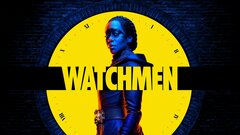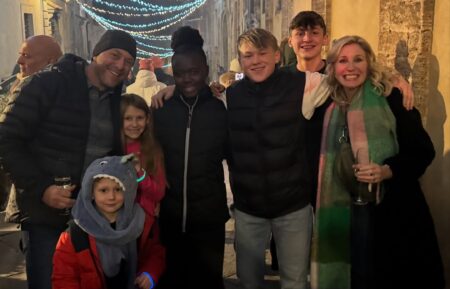‘Watchmen’ Presents a Superhero Film Noir in the Best Episode of the Season (RECAP)
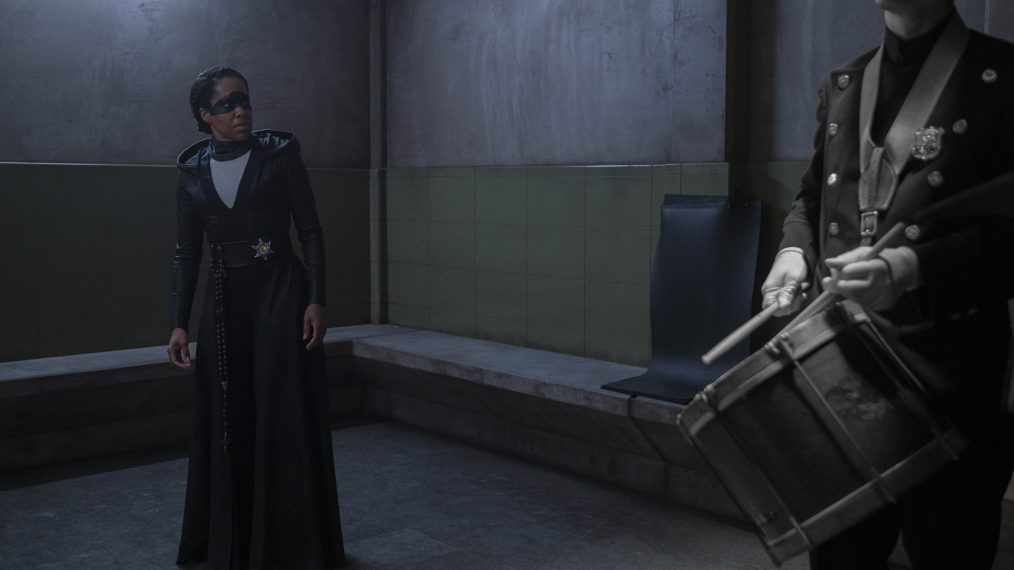
Spoiler Alert
[Warning: The below contains MAJOR spoilers for Watchmen, Episode 6, “This Extraordinary Being.”]
After last week’s fantastic Looking Glass origin story, I wasn’t sure if Watchmen would be able to top itself. Well, I’m happy to be proven wrong so quickly. “This Extraordinary Being” (written by Damon Lindelof and Cord Jefferson) is an absolute belter of an episode: smart, creative, visceral. It’s Lindelof at his most inventive, playing with the formula of episodic television to create a piece of drama that is both thematically enriching and thrillingly unpredictable.
This is Watchmen‘s “International Assassin”—the mindbending episode of The Leftovers that saw Kevin Garvey singing karaoke in hotel purgatory. While this episode never quite reaches the same level on the weird scale, it’s a similar sort of left turn, one that pulls back the curtain on all that came before. It unveils backstory and secrets in an original, visually compelling fashion, rather than merely having a character monologue for five minutes—something I’ve criticized the series for in previous episodes.
“This Extraordinary Being” reveals the history of William Reeves (Louis Gossett Jr.), the mysterious grandpa in the wheelchair. It’s essentially a flashback episode, though it almost feels reductive to use that term here. This is more than a regular flashback. It’s a literal nostalgia trip, as Angela (Regina King) falls into a coma after swallowing her grandfather’s memory-jogging Nostalgia pills. The side effects see Angela’s consciousness transported into Will’s past—and that’s when the fun really begins.
Taking the guise of a 1940s film noir, we flashback to New York in the 1930s for a story that contains all the elements of noir’s classical era: flawed protagonist, police procedural, loner detective, criminal conspiracy, revenge plots, and social problem film all rolled into one. As a genre pastiche, director Stephen Williams nails the look and feel. Shot almost entirely in black-and-white, the episode is all shadowy faces and low-key lighting—accompanied by a superb jazzy score, sometimes off-kilter and unbalanced to conjure this immense sense of dread.
However, it’s not only captivating because of its style and atmosphere, but for the way it daringly reimagines Watchmen‘s history. Lindelof takes a classic character from the comic book and reshapes everything we think we know about that person. It’s a brave choice but one that so perfectly fits the narrative of this season that you’d have to be incredibly cynical not to come away satisfied. How can you be disappointed with a neo-noir superhero origin story?
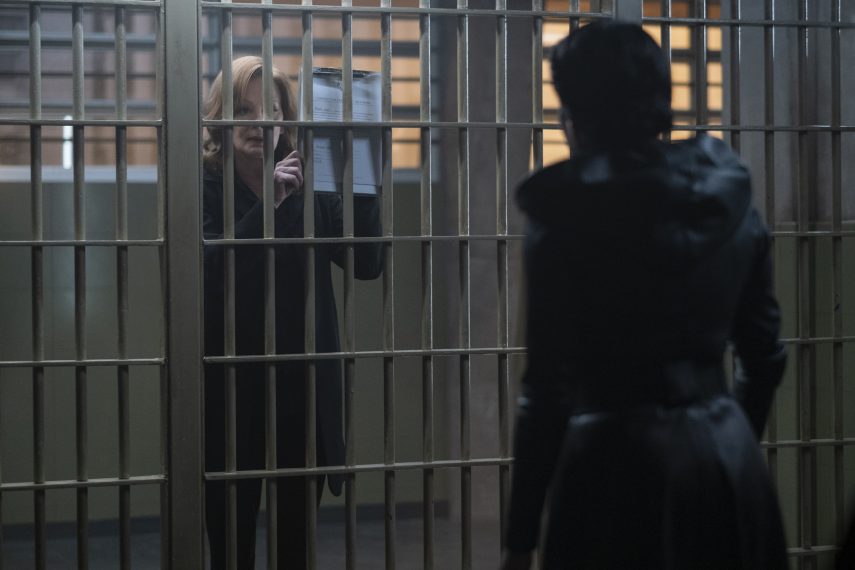
HBO
So it’s late 30’s New York, and a young Will Reeves (Jovan Adepo) has just graduated from the police academy. As one of the first black officers on the force, his hiring is met with a significant amount of controversy; his white superiors don’t even acknowledge him during the badging ceremony. It’s seen as a political hiring, a publicity stunt to show that the NYPD is open to diversity. Nobody really expects nor wants Will to do serious police work.
But regardless of the motivations, Will has worked hard to fulfill his dream of becoming a lawman like his hero Bass Reeves. It’s something which fills him with pride—and fills his wife, June (Danielle Deadwyler), with fear. “You have a gun and stick, and I’m worried how you’ll use them,” she frets over dinner. June has known Will all her life (we learn she was the baby a 6-year-old Will saved in the Tulsa massacre), and she knows who he is deep inside. “You’re an angry, angry man, William Reeves.”
Of course, Will has every right to be angry, and not just because of what he went through as a child in Tulsa. He is still dealing with hatred, discrimination, and systemic racism. When he arrests a white man caught petrol bombing a Jewish deli, he’s told to back off. When Will refuses to let it go, he’s attacked by three cops, who, after beating him senseless, throw a hood over his face and tie a noose around his neck and string him up from a tree. “Keep your black nose out of white folks’ business, n*****, or next time we won’t cut you down,” is the warning.
What happens on this night changes the course of Will’s life forever. As he stumbles home, beaten and bloody, the rope still dangling from his neck, he notices a gang attempting to mug a young couple. Almost without thinking, Will pulls the hood back over his face and fights off the men, saving the couple and, in turn, becoming America’s first masked vigilante. “Hooded Hero Saves The Day,” read the newspaper headlines the next day. That’s right, Will Reeves is Hooded Justice!
This twist on the classic Watchmen character is expertly pulled off and makes so much sense. In the original comic, Hooded Justice is depicted as a white man, but the show explains its way around that in a way that is both satisfying and relevant to this season’s narrative. It’s June who encourages Will to keep wearing the mask—explaining that he’ll get more justice with the hood than he will the badge. “But the townsfolk are going to need to think one of their own is under it,” she says as she covers his eyes with white face-paint.
It’s just such a thrilling reveal as we watch Will become consumed by the Hooded Justice persona. He’s specifically obsessed with trying to uncover a covert group called the Cyclops, a division within the Ku Klux Klan with ties to local businesses and even the police force itself. This means we get to see Hooded Justice beating up Klan members and smashing through shop windows, all the while Angela is living through this in her coma dream. It’s electrifying TV.
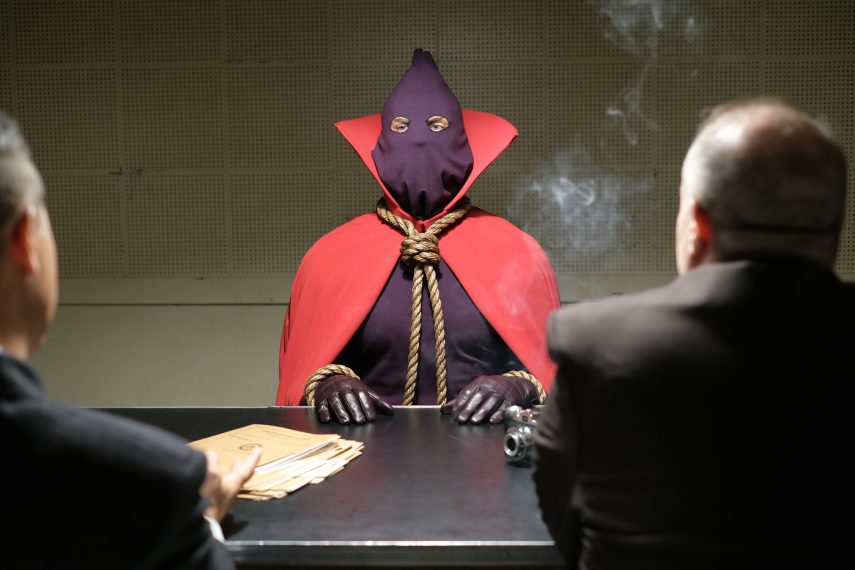
HBO
The episode even touches on the original superhero group, The Minutemen, including one Nelson Gardner (Jake McDorman), aka Captain Metropolis, who begins a homosexual affair with Will. This relationship is also depicted, in particularly sensationalist fashion, in the show-within-a-show, American Hero Story, where Hooded Justice is played by a white actor (30 Rock‘s Cheyenne Jackson). The “real” story is, of course, far more complex and nuanced than its pulpy, prime-time TV portrayal.
Nelson not only talks Will into bed but into joining a group of fellow costumed crimefighters, many of whom were inspired by Hooded Justice. The blonde-haired charmer even promises to help Will take down the Cyclops conspiracy. However, once Will joins the Minutemen, he finds that it’s not much different than the police force. For one, he has to carry on pretending to be white. “Some of the others in the group are not as tolerant,” Nelson tells him.
And despite his previous pledge, Nelson soon brushes aside the Klan conspiracy, instead choosing to focus on masked villains like The Moloch and other more public pleasing endeavors. Just like Will’s hiring on the police force, the addition of Hooded Justice to the Minutemen is no more than a cheap publicity stunt. There is no real desire for change or justice. “You’re going to have to solve black unrest on your own,” Nelson informs Will.
So that’s exactly what Will does. After a riot in a Harlem movie theater, Will discovers that the Cyclops group have been putting hypnotic messages into film projectors, using a mesmerizing, mind-control technique to incite black-on-black violence. With no help from his fellow costumed “heroes,” Will takes matters into his own hands. Adorning the mask, he hunts down those responsible, including the deli arsonist and racist cops, shooting them point-blank and burning their bodies in a meatpacking warehouse.
Will’s descent into violent justice has adverse consequences on his home life. June hoped that Hooded Justice would help remove her husband’s anger. “It didn’t get rid of it,” she cries, “it just fed it.” The hood became something to hide behind because he couldn’t stand what he became—the parallels to Angela’s story are obvious. In the end, Will’s wife vows to return to Tulsa with the children, leaving Will behind.
And in closing, we finally find out exactly what happened to Chief Crawford (Don Johnson) back in the premiere. How did this 100+ year old man in a wheelchair hang a 200+ pounds man from a tree? Well, he didn’t, at least, not physically. Will used the Cyclops mesmerization technique, via flashlight, to put Crawford under hypnotic mind control. He walked him out to the tree and instructed him to hang himself. After all these years, Will never stopped hunting those Klan racists.
All I wanted to do after this episode was stand up and applaud. While Watchmen hasn’t been a perfect series by any means, this incredible episode alone makes the whole endeavor worthwhile. Will some comic book purists be upset with the reimagining of Hooded Justice? Probably. There is always someone complaining somewhere. But it’s not as if this change was forced or in any way disrespectful to the source material. If anything, it deepens the mythology of the Watchmen.
Remember, the season opened with the Tulsa massacre, a tragedy that was swept under the rug and unknown to a large percentage of the American public. In that context, it makes perfect sense that the world within the Watchmen universe wouldn’t know the real story of Hooded Justice. It’s understandable how his race would be whitewashed and his true origins altered for public consumption. It makes all the sense in the world for this particular story, and all I can do is tip my hat to Lindelof and the team for creating one of the year’s best hours of TV.
Additional Notes
- Angela does wake up from her coma at the end of the episode, where she finds herself in the company of the mysterious Lady Trieu (Hong Chau). How she ended up there remains unclear.
- The other reason why Will being Hooded Justice works so well is that in the comic book, the identity of Hooded Justice is never revealed. When the U.S. government ordered the Minutemen to reveal their true identities in 1955, Hooded Justice refused and instead disappeared. Some suspected he retired, others thought he was killed, but his actual fate was never known.
Watchmen, Sundays, 9/8c, HBO
From TV Guide Magazine
What to Expect From 'The Hunting Party's Love Triangle and Mystery
Manifest alum Melissa Roxburgh and the showrunner of NBC’s Hunting Party tease TV Guide Magazine about what’s ahead for the “government conspiracy that just keeps unfolding” — plus, the series’ “good” love triangle. Read the story now on TV Insider.






